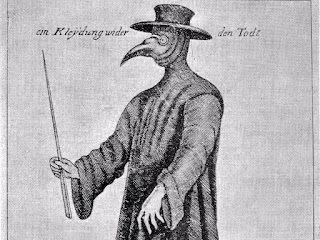I'm currently reading Hilary Mantel's Wolf Hall and was struck by a couple of paragraphs concerning the annual plagues that used to affect the country on the 16th century, which got me to wondering what the economic consequences were for the really big plagues.
It turned out that successive plagues had a successively lower mortality, starting at between 40% and 60% for the Black Death and finally levelling off at about 10% in the 16th and 17th century. However, the result of such huge early mortalities was that the peasants suddenly found themselves in high demand for labour and underwent a huge increase in their standard of living.
The reduction in the workforce also kick-started innovations in mechanisation. Guilds started, which protected artisans. Serfdom was all but abolished, as the mortality among the aristocracy was particularly high. Small landholders bought dead landholders' property at knockdown prices and consolidated them. A lot of what was previously productive farm land was turned over to pasture, with the consumption of meat increasing commensurately. A whole, new, middle class was created.
Seems the herd immunity strategy would have given the remaining workers and unions a lot more power in wage negotiations.
I'm finding Hilary Mantel hard going. I keep either falling asleep or thinking; "Get to the bloody point." She does waffle on a bit and gets you involved in some totally irrelevant conversations. I can see her writing working well as drama, where it's edited down and shortened, but the books are heavy work.
Hilary Mantel vs Philippa Gregory? Give me Gregory any time, but I have to admit that Mantel does seem to get more under the skin of the character.
I'm finding Hilary Mantel hard going. I keep either falling asleep or thinking; "Get to the bloody point." She does waffle on a bit and gets you involved in some totally irrelevant conversations. I can see her writing working well as drama, where it's edited down and shortened, but the books are heavy work.
Hilary Mantel vs Philippa Gregory? Give me Gregory any time, but I have to admit that Mantel does seem to get more under the skin of the character.



No comments:
Post a Comment